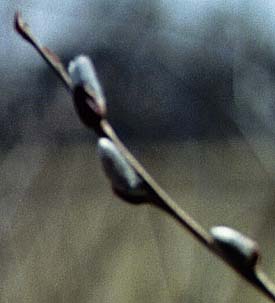
Etymologically, "dwell" comes from to tarry, to linger. There is an implicit sense of transience. Stay awhile, then move on. This house, this body, this earth. As night comes on, fitful rain hits the window. The sound is sharp; it could be ice. I rejoice in the warmth and light of my dwelling, even as I experience its provisionality.
I am a stranger with thee, and a sojourner, as all my fathers were.
It's from another beautiful song. This time, not in my dear father, Raul Stanati's voice, but in Alfred Deller's, the late, magnificent countertenor. It's from an anthem by Orlando Gibbons, based on the 39th psalm, a psalm of lament and of supplication. The psalmist, whose life is like "a puff of wind" and who "walks about like a shadow," prays "turn your gaze from me, that I may be glad again/before I go my way and am no more." It is God's punishment he feels, God's "rebukes for sin." The "gaze" of God is piercing and afflictive: disheartening, debilitating, the ultimate panopticon.
Can we read it as a projected gaze ? A reification of our own afflictive self-consciousness, the big eye/I that is the ego ?
In the text of Gibbons' anthem, the gaze is displaced: "O spare me a little, that I may recover my strength/ before I go hence and be no more seen." The psalmist asks for generic mercy and mourns his own passing, his disappearance from the gaze of others.
Two other fragments of text come to mind. The first, from Waiting for Godot:
"They give birth astride a grave, the light gleams an instant, then it's night once more."
This existentially bleak image contains no dwelling except a glint of light and its implicit eye. Later the image recurs, elaborated:
"Astride of a grave, and a difficult birth. Down in the hole, lingeringly, the grave-diggger puts on the forceps. We have time to grow old. The air is full of our cries."
Well, that's a little better. Midair, on that blankest of pages, we compose our cries.
I walked the river path again yesterday, alert for signs of spring. My eye is tiring of tangled detritus, of thorn and fading leaf, of browns and grays punctuated by the shock of lingering red berries or of a branch that's greenish or maroon. Of everything, underfoot, becoming black slime.
A woman walking a dog stopped as I photgraphed a backlit bank of pale yellow, nearly translucent leaves last week. "Something interesting ?" she asked. "Everything's interesting," I replied, in a yellow ecstasy.

Today I'm not so sure. Winter weariness. It will pass.
At least the recent snowfall has covered the riverbank litter, the plastic springwater bottles flung aside by virtuous, self-hydrating joggers, the potato chip bags dropped by the more phlegmatic strollers, the tires, the shopping carts, the mattresses, sprung umbrellas, booze bottles, cigarette butts, condom wrappers -- and even, in a small iced-over cove, a rubber ball stamped: PROZAC.
Indeed.
Is there any sign of quickening ? Do the branches seem a bit more knobbed, the tight buds slightly fuller ?
There's some undeniable action:

And, even more spectacularly,

and even this

We should not ever doubt that all is flux and flow, and that we have awakened into its dazzling midst. We feel affliction, pleasure; we fill the air with our cries -- for mercy, of delight. We address it all as "God" -- that most capacious of words -- out of the depth of our most inarticulate longing: de profundis clamavi.
The third text is the famous ending of the Diamond Sutra.
So you should view all of the fleeting worlds:
A star at dawn, a bubble in the stream,
A flash of lightning in a summer cloud,
A flickering lamp, a phantom and a dream.
It contains the psalmist's "puff of wind" and "shadow," and the playwright's momentary "gleam" of light. It does not privilege the cries, the supplications, the theistic quid pro quos, the sense of absurdity: ontologically, they are simply fleeting worlds among a myriad fleeting worlds. Waystations, on a long railroad.
Tiny dwellings along the way.
No comments:
Post a Comment